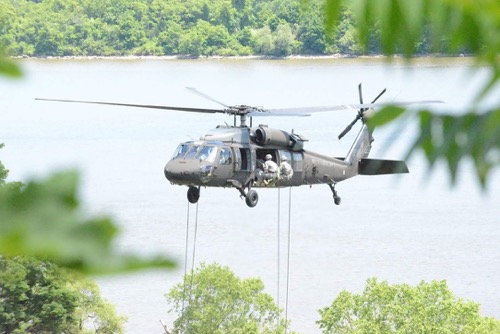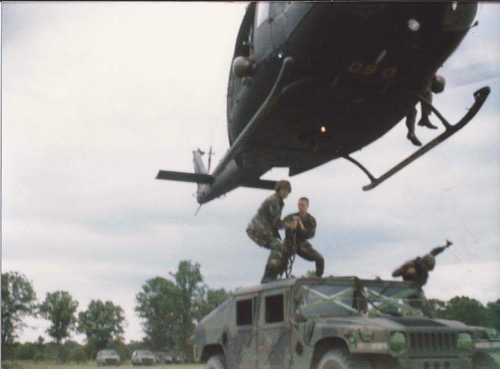Are you nervous about anything?
 Mike, trying to look nervous.
Mike, trying to look nervous.
Nope. Maybe I should be… but I’m not.
Aren’t you worried about the cold?
Not really. It will be cold. Okay, it will be really cold. But we will be very well equipped. Every American is issued a full set of Extreme Cold Weather clothing in Christchurch, New Zealand before deploying to the Ice. I’ve been to a few really cold places before when I was in the Army, so I know what to expect. Fun Fact: Once when I was in the Army I had my “Arctic Canteen” freeze solid while I was wearing it, INSIDE of my sleeping bag, INSIDE of a tent!
Are you nervous about all of the flying?
I enjoy flying in both airplanes and helicopters so it is just a mode of transportation and not a new experience. Again, the Army helped with that!
 This is UH-60 (Blackhawk) hovering in Air Assault training. Photo credit USMA
This is UH-60 (Blackhawk) hovering in Air Assault training. Photo credit USMA
 This shows a Bell UH-1N hovering while infantry sling load an HMMWV.
This shows a Bell UH-1N hovering while infantry sling load an HMMWV.
You HAVE to be concerned about going to the bathroom in really cold temperatures!
It is true that going to the bathroom in really cold temperatures can be a challenge. To make it even more interesting, ALL waste (to include our bodily wastes) have to be collected and shipped back to the United States. So… I’ll be peeing in a bottle. I’ll let you use your imagination for… the other waste.
Aren’t you apprehensive about being with strangers?
I’ve actually gotten to meet most of the people on my team. Dr. Lazzara (The PI of the project) welcomed me to Madison, Wisconsin twice. While there I met and got to know Dave Mikolajczyk and Lee Wellhouse. Both of whom will be deploying with me. So, they aren’t strangers anymore.
https://amrc.ssec.wisc.edu/people/matt.html
https://amrc.ssec.wisc.edu/people/david.html
https://amrc.ssec.wisc.edu/people/lee.html
Come on. You HAVE to be nervous about something.
Okay, if I have to pick something that I’m concerned about I would have to say that I’m concerned about doing my PolarConnect event and posting timely journals like this one. I’m very comfortable with the cold, flying, the physical challenges of the work I’m expected to do and the people I’ll be working with. I do have some concerns about balancing my responsibility to my team and the science and my PolarTREC outreach responsibilities. I like to be prepared so I’ve practiced and studied… but I haven’t actually done it yet. On the other hand, if the weather, or the satellites, or the internet connection won’t cooperate, “It’s all good.” If there is nothing I can do, there is nothing I can do. Ya Know?


Comments
Pagination
Add new comment